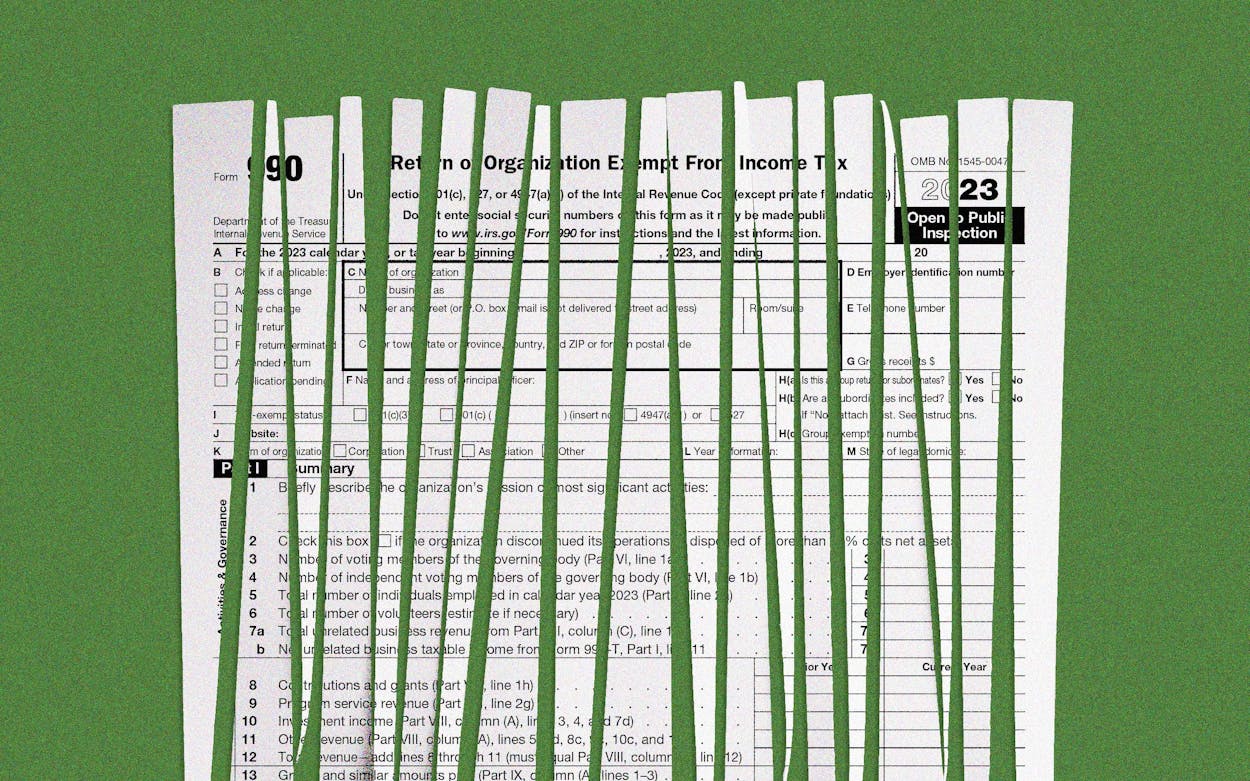The Texas Public Policy Foundation, a right-wing think tank with ties to the state’s most powerful politicians and political donors, has long lobbied legislators to abolish property taxes. So far, this effort has failed. But TPPF has succeeded in another ambitious goal: ducking its own property taxes.
For the past decade, Texas Monthly has learned, the think tank hasn’t paid a single dollar in taxes on its lavish, limestone-fronted, six-story headquarters, just two blocks from the Capitol in downtown Austin. The building’s appraised value is $18 million. How did TPPF manage this feat?
Under state law, exemption from property taxes is reserved only for some nonprofit organizations, including orphan-aid groups and animal shelters. A well-funded think tank that promotes the interests of the oil-and-gas industry and undermines support for public schools, among other causes, would not seem to qualify. Indeed, TPPF was twice denied an exemption. But it persisted by appealing to the comptroller’s office, the statewide tax agency.
In 2015, just one month after he was sworn in as comptroller, Glenn Hegar, a Republican former legislator from Katy, granted the foundation the exemption it had been seeking. So far TPPF has avoided paying about $3 million in taxes on its headquarters. Roughly half of those dollars would have gone to the public schools that the foundation actively works to discredit. In 2023 the comptroller and local tax appraisers renewed the exemption for another five years.
The foundation’s aggressive and questionable use of this tax break has never previously been reported. Nor has its qualification for a separate, federally subsidized construction loan meant for disadvantaged businesses in distressed areas. The tax advantages cast light on how the group may have used its political connections to secure relief that critics say it shouldn’t have received.
TPPF’s influence has risen in tandem with the ascendancy of the hard right in Texas. Founded in 1989, the foundation has grown from a scrappy operation based in San Antonio with an $80,000 annual budget and two employees to a political behemoth with a $21.5 million budget and more than one hundred staffers, including several former GOP elected officials. With its power and money, TPPF has been able to push Republican politicians to adopt many parts of its policy agenda. When Governor Greg Abbott toured Christian private schools last year to sell his plan for private school vouchers, which would divert taxpayer funds from public schools to private ones, he did so alongside an activist employed by the foundation.
The organization has also attained national reach. Former CEO Brooke Rollins served as a policy adviser to President Donald Trump and now runs the America First Policy Institute, a think tank that Politico, noting the number of likely Trump appointees working there, called a “White House in waiting.” Another former TPPF head, Kevin Roberts, now helms the Heritage Foundation, a powerful right-wing policy shop that is laying the groundwork for Trump to radically remake the federal bureaucracy if he wins a second term.
By 2012, TPPF was already a major player in Texas GOP politics. Like an upwardly mobile couple in a starter home, the group needed new digs to impress its friends. It purchased a historic two-story building a short walk from the state capitol. Rollins, the CEO at the time, announced that her organization would add several stories and thousands of square feet of offices and meeting rooms. “The purchase of 901 Congress for our new home marks what Churchill called ‘the end of the beginning.’ Our achievements in our old locations, great as they were, are just the prelude to what comes next,” she boasted.
The overhaul took three years to complete and cost millions of dollars. In 2015, Abbott, Attorney General Ken Paxton, and former governor Rick Perry attended the grand opening of the new building, on San Jacinto Day. Donors and political insiders got a first glimpse of the office’s Texas-themed inlaid floors, golden-metal elevator doors, wood-paneled library, and the Rick Perry Liberty Balcony with its wraparound views of the Capitol and downtown. The new headquarters even had a tagline: “Liberty’s New Address.”
Liberty, its owners believed, should include freedom from property taxes. In 2013, as its building was under construction, the foundation applied for an exemption through its affiliate, 1835 Cannon Ltd. Instead of appealing directly to Travis County, where the property was located, the group applied to Susan Combs, then the state comptroller. That way, an elected Republican official, rather than appointees of a county government run by Democrats, would determine eligibility. TPPF applied under a provision that allows certain charitable organizations with many branches across Texas, such as the Freemasons or Shriners, to get a statewide exemption—a highly unusual move for a think tank with only one office.
In November of that year, staffers in the comptroller’s office denied the application. “There is no evidence of the organization being a subsidiary, branch or chapter of a statewide charitable organization, or that the organization is [a] statewide charitable organization in itself,” a staff member wrote to TPPF in November 2013. The letter informed the foundation that it could apply to Travis County for an exemption.
Instead TPPF went back to the comptroller’s office a year later, this time with a novel argument. Now the think tank claimed that it was a “scientific research organization,” one of the 26 types of charitable establishments that can qualify for a property-tax waiver. In an unsigned four-page document titled “The Scientific Nature of Political Science and Economics: Organization Activities Narrative,” the foundation quoted Albert Einstein, the Texas Declaration of Independence, and an “Introduction to Economics” textbook to bolster its argument that it “conducts scholarly scientific research” and exists “exclusively for scientific educational purposes.” As examples of its bona fides, TPPF pointed to six “scholarly publications” it had issued. Five of the six were written by registered lobbyists, three of whom were former elected officials. None of the six papers was peer-reviewed, as is common with scientific papers. One, written by a former California state representative, purported to show that Texas enjoys the “most economic freedom” while California and New York suffer under “soft tyranny,” based on a measurement tool the author developed.
TPPF’s argument was “ridiculous,” said Heather Way, a University of Texas law professor familiar with this part of the state tax code. “An organization with that level of an advocacy agenda should not be able to claim they’re engaged primarily in scientific activities.”
The comptroller’s staff apparently agreed. In December 2014, the office rejected the foundation’s application, again suggesting that it apply directly to Travis County for the tax exemption that it sought.
The story might have ended there. But in January, Hegar was sworn in as the new comptroller. He had run on a platform of abolishing property taxes, a key TPPF goal. A month later, the comptroller’s office reversed the staff’s earlier determinations and gave TPPF what it wanted: a letter certifying that the foundation qualified for a property tax exemption. A few months later, a staffer in the comptroller’s office noted in the agency’s application processing system that the decision was “approved by Upper Management.” Documents reviewed by Texas Monthly do not offer any further explanation for the about-face.
A former employee of the comptroller familiar with the matter said the decision was politically motivated. “The approval of the property tax determination letter was not a judgment call by upper management,” said the source, who asked for anonymity. “It was clearly favoritism and a misuse of the law.”
Hegar declined a request for an interview. A spokesperson for the comptroller said the allegations were “false, based on conjecture and inconsistent with the agency’s position.” The spokesperson defended the comptroller’s decision to qualify TPPF as a scientific organization, noting that political science and economics “constitutes a branch of scholarly scientific research and education.”
The spokesperson also defended the decision by pointing out that Every Texan, a liberal Austin-based think tank, receives a property tax exemption from the Travis Central Appraisal District for business personal property. Every Texan does not own the building where its offices are located and uses its exemption for computers, furniture, and other business property. The tax break saves the organization about $1,300 a year—almost 270 times less than the value of TPPF’s tax break. It’s not clear how Every Texan qualified; the Travis appraisal district could not locate an application from the organization and told Texas Monthly that it notified the group last year that its exemption would not be renewed in 2024 unless it reapplied. Dick Lavine, senior fiscal analyst at Every Texan, did not know on what basis the organization qualified for the exemption.
Gregory Sindelar, the current CEO of TPPF, declined a request for an interview. A foundation spokesman, Brian Phillips, didn’t respond to specific questions about the tax benefits the foundation received but wrote that it “publishes hundreds of reports, papers, analyses, commentaries, and other products based on the scholarly public policy research we produce every year.”
In July 2015, the Travis Central Appraisal District signed off on the comptroller’s decision on TPPF. The chief appraiser, Leana Mann, said state law requires local appraisers to “accept a letter from the Comptroller as conclusive evidence.”
Out of the 1,771 organizations currently approved by the comptroller for a property tax exemption, only two—TPPF and its affiliate, 1835 Cannon—are think tanks.

TPPF’s claim that it operates as a scientific research organization is hard to square with its steady stream of attacks on established science. The foundation, which is funded by a wide array of fossil fuel interests, has garnered a reputation for its distortions of evidence accepted by the vast majority of scientists, particularly on climate change.
In 2017, then-president Donald Trump nominated the foundation’s top environmental specialist, Kathleen Hartnett White, to lead the White House Council on Environmental Quality. But during her confirmation hearing in the Republican-controlled Senate, Hartnett White struggled to answer basic questions about climate science, falling back on shibboleths—seldom challenged by the Republican policymakers who govern Texas—that carbon dioxide, a planet-heating greenhouse gas, is simply “a plant nutrient.” The White House eventually withdrew her nomination.
More recently, the foundation has waged an assault on renewable energy while trying to prop up official and public support for coal, natural gas, and oil. In a campaign that extends well beyond Texas, TPPF rails against tax benefits for wind and solar power yet is curiously silent about the much larger federal and state tax breaks and other subsidies for fossil fuels. It also delivers a heavy dose of misinformation about climate change, which it says results in only “mild and manageable warming.”
“They are well known as climate deniers and people who relentlessly push fossil fuels,” wrote Andrew Dessler, a Texas A&M atmospheric scientist, in an email. “I’ve never seen anything they’ve done on climate that I would categorize as ‘scholarly’ rather than ‘hackish.’ ”
The property-tax exemption wasn’t the only special benefit the foundation’s headquarters has enjoyed. In 2013, TPPF received a subsidized seven-year $7.8 million loan through a federal program designed—according to the U.S. Internal Revenue Service—to provide “improvements in the lives of residents of low-income communities.” The New Markets Tax Credit program uses such credits to encourage investors to provide capital for business and community groups in impoverished areas. The Treasury Department cited health clinics and day-care centers as examples of businesses the program was designed to help. How TPPF qualified isn’t exactly clear, but the organization received vital help from a Republican elected official.
The financial firm that managed the loan to the foundation was Pacesetter CDE, a financial entity based in Southlake, a Dallas suburb. Applying to participate in the federal program, Pacesetter promised to use all of the tax credits it received to “provide financing to operating businesses that do not have other reasonable financing options” and to provide loans and capital to “disadvantaged businesses.” The Treasury approved the application, and Pacesetter received federal tax credits, which it distributed to investors, and, in return, used the invested capital to make “qualified low-income community” loans.
It isn’t clear how TPPF and 1835 Cannon qualified as “disadvantaged.” At the time, TPPF’s boards included its billionaire founder (San Antonio medical technology magnate James Leininger), two wealthy Midland oil executives (Tim Dunn and Kyle Stallings), the wife of a former Republican U.S. senator (Wendy Lee Gramm of Helotes, outside San Antonio), an energy investor who ran a firm with several billion dollars in assets (Jeff Sandefer of Austin), and the heir to a substantial ranching and oil fortune (Windi Grimes of Houston).
Giovanni Capriglione served as Pacesetter’s chief compliance officer. At the time of the loan, he had recently begun serving as a Republican member of the state house from the Dallas area. Pacesetter provided the loan for TPPF’s new headquarters and lined up investors—who are not identified in filings reviewed by Texas Monthly—who received more than $3 million in tax credits in exchange for their investments. Capriglione told Texas Monthly that the investment “adhered to the necessary legal, regulatory, and contractual frameworks in place at the time” but did not reply to specific questions sent to him. (In an email to Texas Monthly, the Treasury Department’s acting inspector general wrote the agency planned to audit how the government monitors these tax credit allocations; in 2022, the inspector conducted a focused review of tax credits in Wisconsin and concluded there were “concerns over the lack of clearly defined requirements and guidance” for determining what groups should benefit from low-interest loans distributed as part of the New Market Tax Credit program.)
Subsequently, TPPF’s headquarters—built with a tax-subsidized loan and exempt from property taxes—has become a hub for Republican politicians in Texas who typically rail against government subsidies, including the use of the tax code to favor one business or industry over another. In March, Governor Abbott attended TPPF’s annual off-site policy banquet, where Republican politicians mingle with conservative megadonors. The governor gushed with praise. In the past year, he said, the foundation accomplished more of its agenda than has “ever in the history of the Texas Public Policy Foundation.” He credited TPPF with one of his biggest works in progress: the whittling away of the property tax that finances public schools.
- More About:
- Politics & Policy










